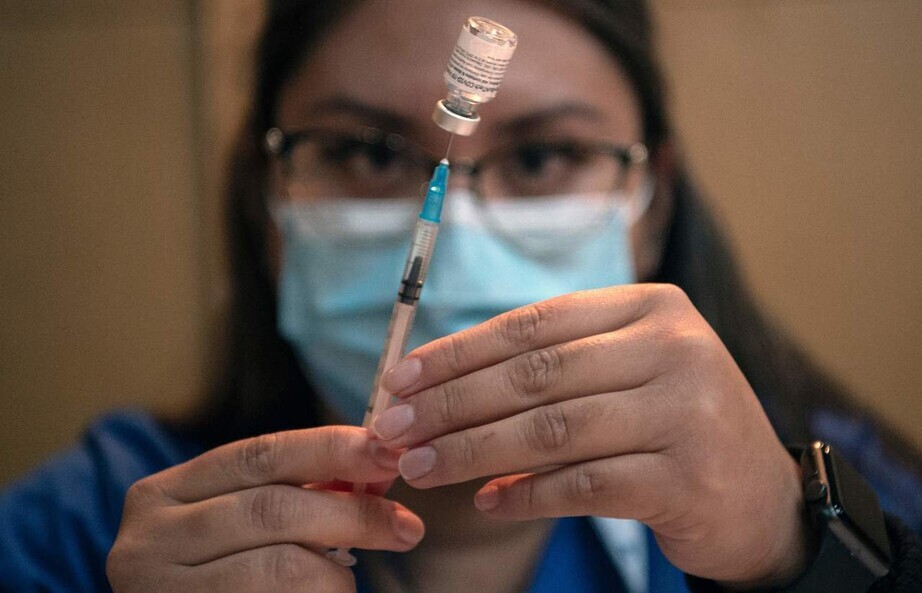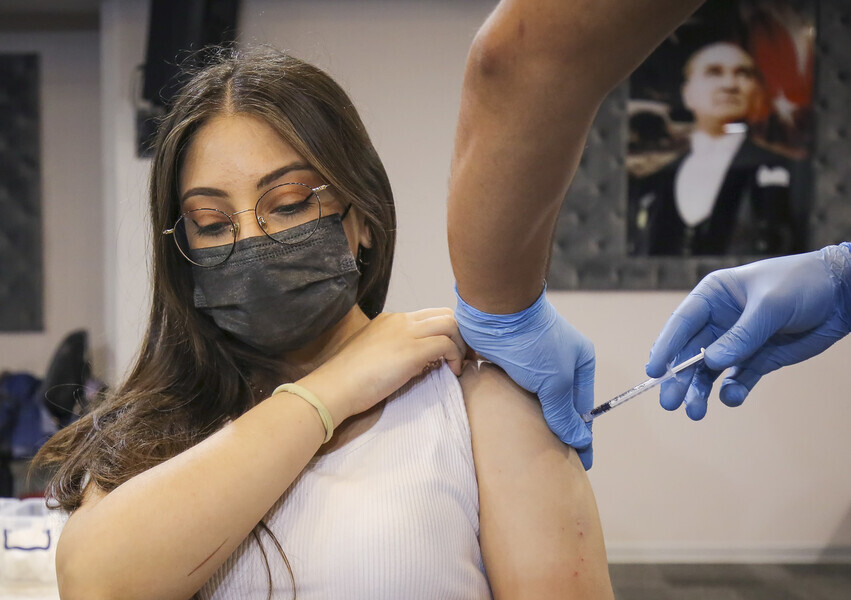hankyoreh
Links to other country sites 다른 나라 사이트 링크
Fight against COVID-19 faces new challenge: Delta variant

The Delta variant of the COVID-19 virus, which originated in India, is rapidly breaking through public health defenses set up by countries around the world. Delta has already been detected in more than 90 countries, including South Korea. In some countries that have failed to stop the spread of the variant, vaccine-based containment schemes seem on the verge of crumbling. Just when people around the world were taking off their masks, Delta is once again stirring up fears about COVID-19.
How strong is it?
The Delta variant is dangerous because of how easily it can be transmitted. It’s reportedly three times as contagious as the original, unmutated coronavirus.
South Korea’s Central Disease Control Headquarters said that Delta has a 60% higher transmissibility and a 126% higher hospitalization rate than Alpha, the first viral variant.
Alpha, which caused a surge of cases in the UK at the end of 2020, was said to be 70% more infectious than the unmutated coronavirus, but Delta is much more infectious than that.
The Indian government announced Wednesday the emergence of a subvariant of Delta, called Delta Plus, which is causing even more concern.
After the appearance of Delta, India saw a drastic increase in the number of COVID-19 cases, starting in late March. The daily caseload peaked at over 400,000 in early May.
India didn’t have a single day with more than 100,000 cases last year, but it reported at least 100,000 cases every day from April 6 to June 10. The spread of Delta is regarded as the main factor behind India’s latest wave of COVID-19 cases.

The UK is one of the countries facing a serious impact from Delta.
Even though the UK was the first country to begin COVID-19 vaccination at the end of 2020 and had administered at least one dose of the vaccine to 80% of the population by the beginning of June, it reported 16,135 cases of COVID-19 on Wednesday. That forced the reimposition of lockdown measures that had been in place back in February.
Delta causes around 98-99% of the UK’s recent cases.
Given the UK’s history of colonial rule over India, many of its citizens have ties with the subcontinent. That means the UK receives more visitors from India than other countries do, and it didn’t ban travel from India until April 23.
The UK also allowed its citizens to travel overseas on May 17, making it easier for virus variants to enter the country. Another factor is that the UK administered many doses of the AstraZeneca vaccine, which is less effective at preventing Delta.
How are other countries faring?In addition to the UK, Delta already accounts for a very high percentage of new cases in Russia and Portugal – 99% and 96%, respectively. In Germany, Delta is still at 15%, but rising fast, with cases doubling over the past week.
This trend is likely to pick up speed. The European Centre for Disease Prevention and Control said Wednesday that it predicts Delta will account for 90% of all new infections in the EU by the end of August.
After Israel lifted indoor mask requirements, rising numbers of Delta infections prompted the government to recommend mask usage again indoors.
Delta infections are also rising steeply in the US, the country with the most confirmed cases of COVID-19.
Rochelle Walensky, director of the US Centers for Disease Control and Prevention, is concerned that the number of Delta infections in the US has recently been doubling every two weeks.
As of Wednesday, Delta represented about 30% of new COVID-19 cases in the US. Delta is expected to become the dominant virus variant within a month.

Delta infections have also been occurring in South Korea since April, though not on the level of the UK or Europe. So far, 256 cases have been identified, 190 through genomic testing and 66 through contact tracing.
According to South Korea’s Central Disease Control Headquarters data, the main virus variants — Alpha, Beta, Gamma, and Delta — account for 39.6% of domestic cases of COVID-19. Alpha represents 84.8% of those variant cases, while Delta represents 8.5%.
In other words, viral variants are causing about 40 of every 100 confirmed cases in Korea, with 34 of those variants being Alpha and three being Delta.
How can Delta be stopped?While variants can be prevented to some extent with vaccines, they’re not completely effective. Notably, the prevention rate is much lower for those who have only received their first dose.
According to a UK’s public health authorities study, the Pfizer vaccine was 87.9% effective at preventing Delta, while the AstraZeneca vaccine was 59.8% effective.
That’s considerably lower than the two vaccines’ efficacy at preventing the original coronavirus (Pfizer: 91.3%, AstraZeneca: 81.5%).
And even that level of effectiveness applies to those who’ve received both doses. Both vaccines were much less effective against Delta for those with just a single dose (Pfizer: 33.2%, AstraZeneca 32.9%).
The single-dose Janssen vaccine is 60% effective at blocking Delta.
By Choi Hyun-june, staff reporter
Please direct comments or questions to [english@hani.co.kr]

Editorial・opinion
![[Column] Season 2 of special prosecutor probe may be coming to Korea soon [Column] Season 2 of special prosecutor probe may be coming to Korea soon](https://flexible.img.hani.co.kr/flexible/normal/500/300/imgdb/original/2024/0426/3317141030699447.jpg) [Column] Season 2 of special prosecutor probe may be coming to Korea soon
[Column] Season 2 of special prosecutor probe may be coming to Korea soon![[Column] Park Geun-hye déjà vu in Yoon Suk-yeol [Column] Park Geun-hye déjà vu in Yoon Suk-yeol](https://flexible.img.hani.co.kr/flexible/normal/500/300/imgdb/original/2024/0424/651713945113788.jpg) [Column] Park Geun-hye déjà vu in Yoon Suk-yeol
[Column] Park Geun-hye déjà vu in Yoon Suk-yeol- [Editorial] New weight of N. Korea’s nuclear threats makes dialogue all the more urgent
- [Guest essay] The real reason Korea’s new right wants to dub Rhee a founding father
- [Column] ‘Choson’: Is it time we start referring to N. Korea in its own terms?
- [Editorial] Japan’s rewriting of history with Korea has gone too far
- [Column] The president’s questionable capacity for dialogue
- [Column] Are chaebol firms just pizza pies for families to divvy up as they please?
- [Column] Has Korea, too, crossed the Rubicon on China?
- [Correspondent’s column] In Japan’s alliance with US, echoes of its past alliances with UK
Most viewed articles
- 1AI is catching up with humans at a ‘shocking’ rate
- 2After election rout, Yoon’s left with 3 choices for dealing with the opposition
- 3Is Japan about to snatch control of Line messenger from Korea’s Naver?
- 4South Korea officially an aged society just 17 years after becoming aging society
- 51 in 5 unwed Korean women want child-free life, study shows
- 6[Column] ‘Choson’: Is it time we start referring to N. Korea in its own terms?
- 7Korea’s 1.3% growth in Q1 signals ‘textbook’ return to growth, says government
- 8No good, very bad game for Korea puts it out of Olympics for first time since 1988
- 9[Editorial] Japan’s rewriting of history with Korea has gone too far
- 10Why Korea shouldn’t welcome Japan’s newly beefed up defense cooperation with US